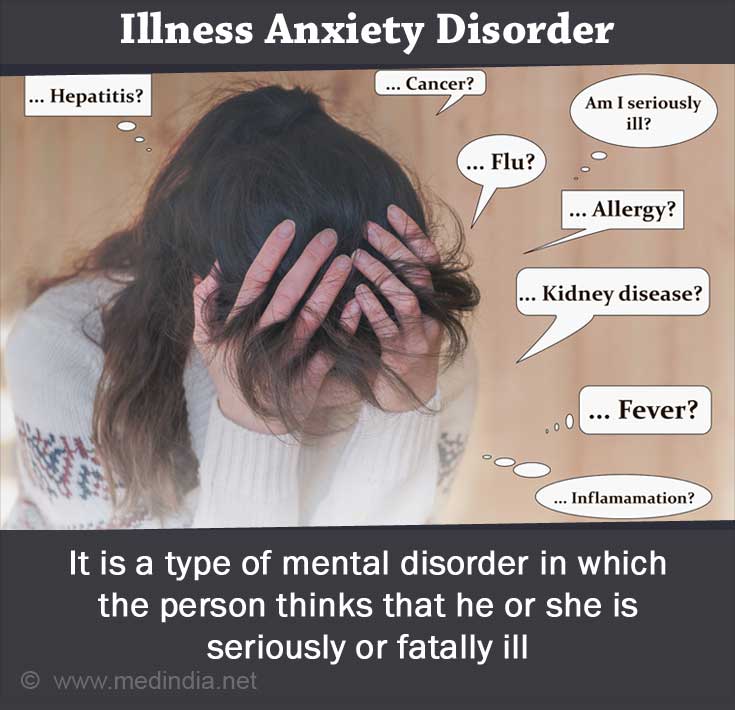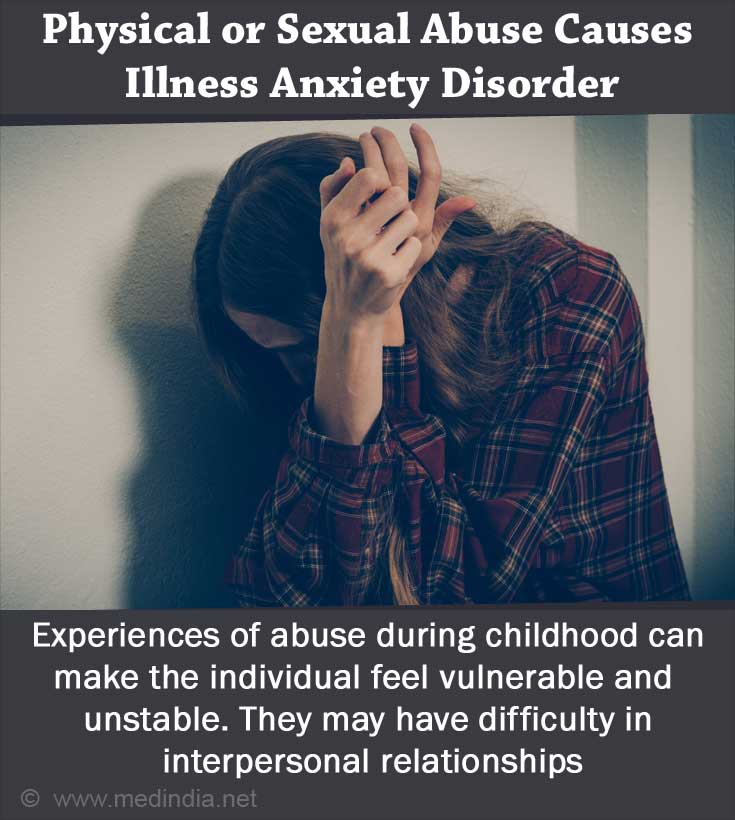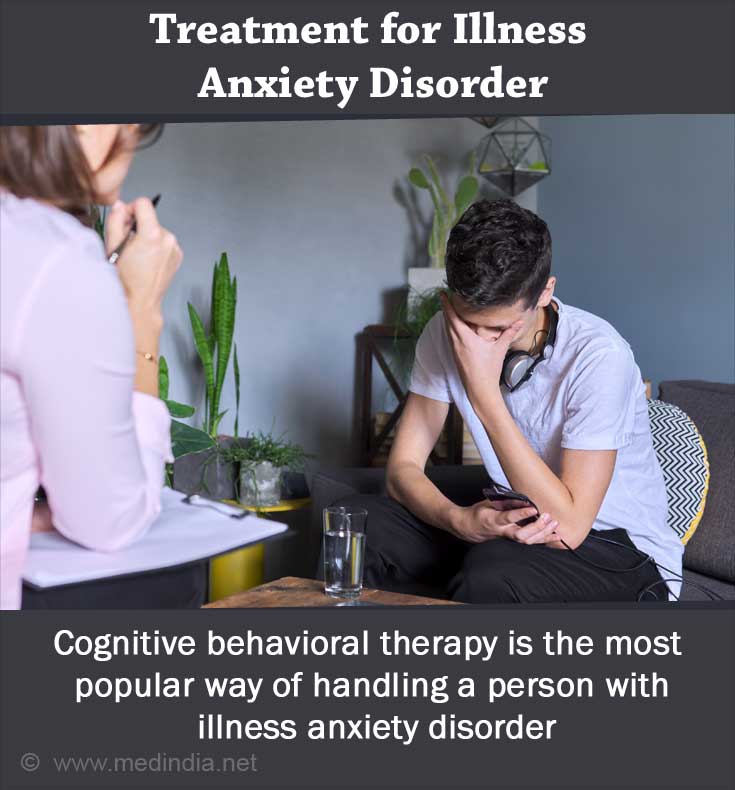- Hypochondriasis - (http://en.wikipedia.org/wiki/hypochondriasis)
- Illness anxiety disorder - (http://www.mayoclinic.org/diseases-conditions/hypochondria/basics/definition/con-20028314)
What is Illness Anxiety Disorder?
"Men make use of their illnesses at least as much as they are made use of by them." - Aldous Huxley
Illness anxiety disorder refers to a type of mental disorder in which the person thinks that he or she is seriously or fatally ill. The belief is despite negative medical evaluations and reassurances from the doctor that no physical health problem is detectable. Normal bodily functions like heart beats, bowel movements, etc., may be regarded as symptoms of an unknown serious illness. Sometimes, minor symptoms like a runny nose or a headache may be thought to be symptoms of a brain tumor. Other terms used to refer this illness include hypochondria, hypochondriasis and somatic symptom disorder.

Not all people suffering from illness anxiety disorder express their concern about their imaginary illness. Some persons may use vague names like sore kidneys, tired nose, etc., for their so-called illness. Some may just avoid the names and reminders of illness and medical professionals for their routine medical checkup. This may also be dangerous as minor illnesses may proceed to more serious conditions if they are not attended on time.
The severity of hypochondria varies with the person. A full-blown illness anxiety disorder can cause problems that interfere with the normal daily activities and work. Severe hypochondria can disable the individual completely without any actual physical illness.
Diagnosis of hypochondria can be a challenge as the individual would be concerned about seeing his primary care physician, instead of a mental health professional. Hypochondria can be identified by a primary care physician when they find that the patient is concerned about his health despite negative results of the lab tests and other diagnostic tools.
What are the Causes of Illness Anxiety Disorder?
Hypochondria or illness anxiety disorder can occur in a person without any real cause. However, some triggering factors may contribute or exacerbate the underlying hypochondriac belief about their imaginary illness.
Attention-seeking: Some people who may feel neglected in the family may bring them to the limelight. Experiences of negligence during healthy childhood and extra attention during an illness can be a cause of hypochondriasis in a person.
Serious illness during early years of life: The mental impact of a serious illness during childhood could cause fear and anxiety of developing another illness during later years. So, the individual may become over-cautious and anticipate the same illness or another one. Extra attention during an illness during childhood can also cause anxiety that any minor health abnormality can cause serious consequences if they are not attended properly.
Serious illness or death due to illness of a close family member: When a child sees that a family member who is seriously ill is getting all the attention, they tend to link expression of love and affection to the illness. Death of a sick person can cause serious concerns and fear in the child about personal health.
Physical abuse or Sexual abuse during childhood: Experiences of abuse during childhood can make the individual feel vulnerable and unstable. They may have difficulty in interpersonal relationships, which may cause them to be hypochondriac for seeking attention.

Overly-protective parents or caretakers: Parents who are anxious about their children’s health can be the reason for a child to develop hypochondriac behavior during later years. Kids’ health anxiety may be present in most parents, but over-indulgence in their health can cause trouble.
Internet as a trigger for hypochondria: People take to looking into the internet for their symptoms that may be harmless. The information on the internet presents all possible disorders associated with a particular symptom or set of symptoms. As some symptoms can be common in mild as well as serious illnesses, a person with illness anxiety disorder may consider the worst possible disorder to be the cause of his own presenting symptom or symptoms.
What are the Symptoms and Signs of Illness Anxiety Disorder?
Symptoms of health anxiety disorder can start with usual concerns about one’s health. Frequent health checkups, doctor visits and laboratory tests can raise a concern about the presence of hypochondriasis by a close family member or the caretaker.
A person with hypochondriasis often presents with the following characteristic behaviours.
- Intense, long-term anxiety of the presence of a serious illness or fatal disease.
- Repeated visits to doctors and having laboratory checks done very frequently. They ask too many questions to doctors and may also argue with the medical professionals that their symptoms are being ignored.
- They believe that they have the disease that would have just heard or read about.
- They may constantly switch doctors; especially if the doctor they visited tries to reassure that they are not sick.
- Frequent checking of body vital parameters such as pulse or blood pressure
- Frequent examination of the body for lesions, lumps, sores and warts.
- Worrying too much about normal body sensations and minor symptoms.
- Continuously talking about their symptoms and suspected diseases with whoever listens to them.
When a person is suspected to be overly anxious about their health, even after the confirmation of the absence of the suspected illness, it is advisable to see a mental health professional regarding their health anxiety.
How to Diagnose Illness Anxiety Disorder?
Identifying hypochondria in a person can be a challenge. Not everyone who is concerned about their illness can be diagnosed as a hypochondriac. Sometimes, a real illness cannot be easily identified with the presenting symptoms. This can cause concern and anxiety and the person may go for a second opinion or further tests.
However, since illness anxiety disorder does not involve any real physical illness, a close friend or family can help them consult a mental health professional.
The Diagnostic and Statistical Manual of Mental Disorders has renamed hypochondria with a new term “illness anxiety disorder” in its newly published DSM-5 guidelines. Diagnostic guidelines of hypochondria in DSM-IV mention the following criteria.
- Based on the person’s misinterpretation of bodily symptoms, the person believes that he has a serious disease.
- Despite appropriate medical evaluation and negative test results, this belief persists.
- Delusional disorder must be ruled out.
- This belief about having a disease interferes with daily living and social and personal relationships and activities.
- The duration of the disturbance is for a minimum of 6 months.
- Differential diagnosis of anxiety disorder, panic disorder, major depressive disorder, obsessive-compulsive disorder and separation anxiety or any other related mental illness must be done to rule them out.
What is the Treatment for Illness Anxiety Disorder?
Treatment for hypochondria includes a combination of psychological counseling, creating awareness about the condition and anti anxiety or anti-depressive medications
Counseling: Cognitive behavioural therapy is the most popular way of handling a person with illness anxiety disorder. Counseling sessions would include explaining the problem, how it is related to some negative experiences in the past and how to cope with the anxiety when it arises.
Education about hypochondria: Explaining the nature of hypochondria as an illness that can occur in any one and try to relate and understand the problem. Counseling sessions include explaining what illness anxiety disorder is, the cause of the disorder and how to cope with the fears that arise due to the concern about their health.

Medications: Antidepressant medication is usually prescribed for a person with anxiety due to concerns about their health. Tricyclic antidepressants like clomipramine and imipramine and serotonin reuptake inhibitors such as paroxetine are the usual drugs that can help cope with the anxiety associated with the disorder.
What is the Prognosis of Illness Anxiety Disorder?
A person with illness anxiety disorder may suffer for months or even years. The anxiety about the health may manifest for some periods of time and may not surface for a long period of time. In such cases, one cannot assume that the disorder has been cured.
Some patients respond well to treatment like counseling or medication or even a combination of both. However, solving the underlying reason or cause of the problem can lead give better results with the treatment procedures.








